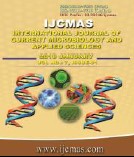


 National Academy of Agricultural Sciences (NAAS)
National Academy of Agricultural Sciences (NAAS)

|
PRINT ISSN : 2319-7692
Online ISSN : 2319-7706 Issues : 12 per year Publisher : Excellent Publishers Email : editorijcmas@gmail.com / submit@ijcmas.com Editor-in-chief: Dr.M.Prakash Index Copernicus ICV 2018: 95.39 NAAS RATING 2020: 5.38 |
The sufferings and bottlenecks of main extension systems in India are well deliberated and documented. The search for evolving the alternate innovation system for agricultural technology dissemination is rigorously pursued at national level. Five yearly (2009-10 to 2014-15) research project on technology dissemination for the distantly located farmers were executed by linking the public funded institution of village post offices of India and the premier agricultural research institute ICAR-Indian Agricultural Research Institute (IARI), New Delhi. The experiences emanated from this research were empirically reported. From the modest beginning of linking with seven post offices in the only state of Uttar Pradesh, the model is being successfully in operation across 13 states of the country with involvement of 130 village based post offices across 36 districts of the country. With the institutional arrangement mutually agreed between the concerned department of post and department of agriculture, the figure is expected to be 500 post offices across 100 districts of the country in time to come on public-public partnership model. On all possible techno-economic and organizational parameters, the model proved not only to be timely, cost-effective and replicable rather sustainable also. The model has strong in-built mechanism to reach to the unreached farmers of the country and making agriculturally technologies accessible to them.
 |
 |
 |
 |
 |